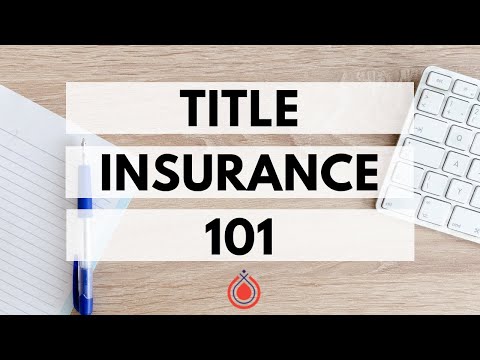Understanding Title Insurance: A Definitive Guide
In the high-stakes realm of property ownership, overlooking details can be akin to sailing the treacherous seas without a lifeboat. In essence, title insurance is that lifeboat. It’s a unique form of indemnity policy pivotal in the mortgage landscape, rooted in safeguarding your ownership rights. Designated to shield against financial loss from defects in the title, it covers both lenders and buyers from potential legal claims against the ownership of a property.

Now, wouldn’t you want to sleep like a baby knowing you’re cushioned against unforeseen property disputes? Sure you would! Title insurance accounts for those headaches you might not even see coming – from outstanding lawsuits to undisclosed heirs popping up.
Policies generally come in two flavors: one that protects the lender, a staple in their Underwriting process, and another that protects you, the buyer, from the ghosts of a property’s past. And let’s be real, you don’t want to inherit someone else’s financial nightmares, do you?

The Assurance of a Secure Investment
Taking the plunge into property investment is no small beans. Title insurance acts like a financial guardian angel, watching over your property from the demons of past owners’ mistakes. We’re talking liens, encumbrances, and those oh-so-lovely easements that can appear out of seemingly thin air.
Consider this your crash course in risk management: without title insurance, your dream home could come with some baggage—legal drama courtesy of previous owners. And who needs that kind of reality check after laying down a hefty investment? Not you, right?
Let’s paint a picture: imagine discovering after the fact that the seller had a murky right to sell in the first place, or there’s an ancient tax lien on your new abode. That’s when title insurance goes from being a line item on your closing costs to the superhero of your property saga.

| Feature/Benefit | Description |
|---|---|
| Purpose of Title Insurance | Protects real estate owners and lenders against property loss or damage due to liens, encumbrances, or defects in the title. |
| Types of Title Insurance Policies | 1. Owner’s Policy – Protects the property buyer. 2. Lender’s Policy – Protects the mortgage lender. |
| Coverage Duration | Title insurance is a one-time purchase and provides coverage for as long as the policyholder (or their heirs) has an interest in the insured property. |
| Cost | Generally ranges from 0.5% to 1% of the home purchase price, depending on state and policy details. Paid as a one-time premium at closing. |
| What Title Insurance Covers | – Undisclosed heirs claiming ownership. – Forged documents or fraudulent transactions. – Errors in public records. – Existing liens or encumbrances. |
| What Title Insurance Does Not Cover | – Financial loss not related to the property title. – Issues that arise after the purchase date. – Zoning or land use issues not recorded in public records. |
| Optional Endorsements | Additional coverages can be added to policies to cover specific potential risks like boundary disputes or certain zoning issues. |
| How to Obtain Title Insurance | Through a title company or attorney, usually during the real estate transaction process (often facilitated by real estate agents or mortgage lenders). |
| Common Providers/Underwriters | First American, Fidelity National Title, Stewart Title, Old Republic National Title, and others. |
| Benefits of Title Insurance | – Peace of mind knowing title defects are covered. – Protection from financial loss up to the policy amount. – Legal defense costs covered in disputes. |
| Comparison Shopping | Prices can be regulated by state, but comparison shopping can still help find the best service and optional coverages. |
Unveiling the First Key Benefit: Claims Protection
Apart from your home potentially being your castle, it’s also ground zero for financial stability. Title insurance is your moat—digging deep to protect against any claimant who tries to storm your gates. The stats don’t lie: claims range from the benign to the bizarre, all with the potential to deliver a serious blow to your asset’s value.
Case in point: the unsuspecting homeowner who learns that their property was once sold to someone else due to a clerical error. Sqash that with title insurance, and you’re no longer the tragic protagonist in the tale of property loss. Now, isn’t that something to raise a glass to?
Legal Defense: A Crucial Component Of Title Insurance
Sure, nobody buys a home expecting to be thrust into the boxing ring of legal tiffs. But sometimes, you gotta roll with the punches. Title insurance gives you those gloves—a legal defense that’s prime to tackle any jabs from previous owners’ undisclosed legal entanglements.
Imagine you’re knee-deep in unpacking boxes when you’re hit with a notice of a pending lawsuit over a boundary dispute. That’s when you’ll thank your lucky stars for the protective cloak of your title insurance policy minding your back. In terms of dollars and sense, the legal fees alone could ring up a bill more eye-watering than a spicy plate of jalapeño poppers, potentially leaving your finances up in smoke without coverage.
Mitigating the Risk of Hidden Hazards
Buying a property without title insurance is like running a marathon without training—you’re just setting yourself up for pain. These “hidden hazards” are the sneaky stumbling blocks lurking in paperwork and history, waiting to sprain your financial stability.
Thank heavens, then, for the watchful eyes of title experts poised to sprint through layers of historical property data. This due diligence is the pre-game stretch you need to ensure your property purchase isn’t tripped up by the unexpected. In the grand spectrum of risk mitigation, title insurance doesn’t just identify hazards—it’s the all-star defense your hard-earned dollars deserve.
Fraud Prevention and Peace of Mind
Let’s get real about a modern-day scare: real estate fraud. It’s no laughing matter—no funny Jokes For teens here. With identity theft artists becoming increasingly sophisticated, title insurance is no longer optional; it’s essential.
Yes, it’s disturbingly easy for a scam artist to assume false ownership and sell a property that’s not theirs to sell. But with title insurance, these Grinches galloping off with your property dreams find themselves stopped in their tracks. And let’s face it, knowing you’re covered not only keeps your blood pressure in check—it also ensures your smiles per mile ratio remains high in your homebuying journey.
Smooth Property Transfer: Ensuring Ease of Succession
Alright, fast forward to a time when you’re handing down your property like a family heirloom. You want that process smooth as silk—no snags, no drama. Title insurance is akin to a finely tailored suit in this scenario, ensuring the perfect fit for ease of succession.
When titles transfer, it can feel like a relay race where you’re passing the baton. Now imagine the next runner dropping it because you handed them an invisible hurdle—a title issue, for instance. Not the legacy you had in mind? That’s where title insurance earns its keep, ironing out potential wrinkles so your property legacy isn’t marred by unforeseen issues.
Conclusion: Title Insurance’s Unmatched Value in Real Estate
Let’s wrap this up as neatly as the ribbon on a closing day gift basket. Across the board, the key benefits of title insurance are clear. From claims protection to legal defense, and peace of mind against fraud to streamlining property transfer—it’s a full-service valet for your property’s past, present, and future.
Title insurance is a pillar of the real estate world, undoubtedly here to stay and evolve as the bedrock of property transactions. Whether you’re dealing with a quaint bungalow or a lofty high-rise, it stands as a testament to the value of due diligence and the protection of assets.
So, my friends in property pursuits, consider title insurance the quiet guardian of your investment dreams. It’s the unsung hero that allows you to hold the keys to your kingdom with unshakable confidence. Now, isn’t that a resolution worth making for your next property adventure?
Unwrapping the Perks of Title Insurance
Hey folks, let’s chat about something that might sound as dry as a day-old bagel but is actually juicy with benefits. Yep, you guessed it: we’re talking about Title Insurance. This little gem could be the unsung hero of your property purchase, so buckle up as we unpack the top five perks that come with this neat package of a policy.
Your Trusty Sidekick Against Hidden Histories
First up, let’s talk about the awesome power of a thorough Title Search. Imagine you’re a detective in a mystery movie, digging into the past of your property to unearth any hidden secrets. This process is all about making sure there are no skeletons in your house’s history closet—figuratively speaking, of course. It could be anything from old liens, boundary disputes, or some odd claim to the land by a long-lost relative who’s as hard to pin down as the ‘Special Hours’ sign at a Fred Meyer fuel center. Title insurance swoops in to protect you if any of these surprise issues try to crash your property party.
USDA Loan? No Problem!
For those sweet souls out there who’ve snagged themselves a “USDA Loan”, title insurance is like that friend who covers your back when you venture into the financial wilderness. USDA loans are fab because they come with no down payment, but just like you wouldn’t wander into the wild without a compass, you shouldn’t navigate a USDA loan without title insurance. It’s the safety net that ensures your dream home doesn’t become a financial fiasco.
The Matthew Glave of Real Estate
Alright, stick with me here. You know how character actor “Matthew Glave” pops up in movies and TV shows, delivering solid performances every time? Well, that’s kind of like title insurance—it might not be the lead role in your real estate transaction, but it’s a top-notch supporting actor that gets the job done. Glave is known for diverse roles across various genres, and similarly, title insurance covers a wide range of unforeseen issues that might arise after you’ve signed the dotted line.
Avoid the Plot Twist with Callum Turner
Think of title insurance as your very own “Callum Turner” in the real estate story—just as Turner might perform an unexpected plot twist in his next big screen appearance, title insurance prepares you for any dramatic twists in your property’s title tale. From previous owners’ debts to legal hiccups, this policy has the potential to save your cinematic homebuying experience from turning into a tragedy.
In Forbearance? Title Insurance Holds the Fort!
Last, but by no means least, if you ever find yourself in a financial bind and need to define forbearance, title insurance is like your steadfast fort, defending your castle (aka your property) from potential invaders. If a claim arises when you’re struggling with mortgage payments, title insurance ensures you won’t have to forfeit your stronghold. It keeps the drawbridge up and the moat monster at bay, so to speak.
So there you have it, folks! Just like finding a surprise onion ring in your fries, title insurance offers hidden delights that you didn’t even know you needed. With this unsung hero in your corner, you can own your peace of paradise with confidence!




